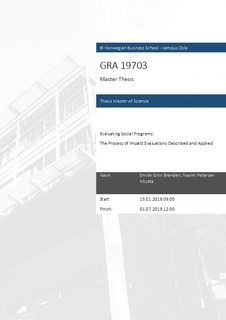| dc.contributor.author | Brenden, Emilie Grini | |
| dc.contributor.author | Miyata, Naomi Petersen | |
| dc.date.accessioned | 2019-10-25T06:48:46Z | |
| dc.date.available | 2019-10-25T06:48:46Z | |
| dc.date.issued | 2019 | |
| dc.identifier.uri | http://hdl.handle.net/11250/2624315 | |
| dc.description | Masteroppgave(MSc) in Master of Science in Business, Economics - Handelshøyskolen BI, 2019 | nb_NO |
| dc.description.abstract | There is an increasing demand for quality evaluations of aid projects to find out what
works for development and what does not. The effect of specific aid projects should
be measured through impact evaluations using robust methodologies. We believe that
evidence from proper impact evaluations can help move the world towards better
policy-making and poverty reduction. This thesis provides a framework for the
process of conducting an impact evaluation from beginning to end. Our proposal is
that the best way to design an aid project is to (1) include the steps of careful resultbased
monitoring in the impact evaluation process, and (2) make the impact
evaluation a randomized controlled experiment if the circumstances allow for it.
Randomization should ensure that the measured effects can be attributed to the
project in question. To demonstrate the practical application of our framework, the
framework is applied to an agricultural development project by Norwegian Church
Aid aimed at smallholder farmers in Malawi. | nb_NO |
| dc.language.iso | eng | nb_NO |
| dc.publisher | Handelshøyskolen BI | nb_NO |
| dc.subject | samfunnsøkonomi | nb_NO |
| dc.subject | economics | nb_NO |
| dc.title | Evaluating Social Programs: The Process of Impact Evaluations Described and Applied | nb_NO |
| dc.type | Master thesis | nb_NO |
